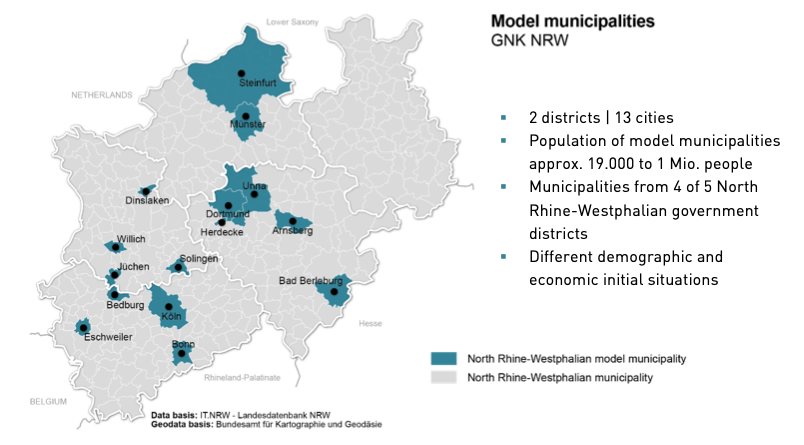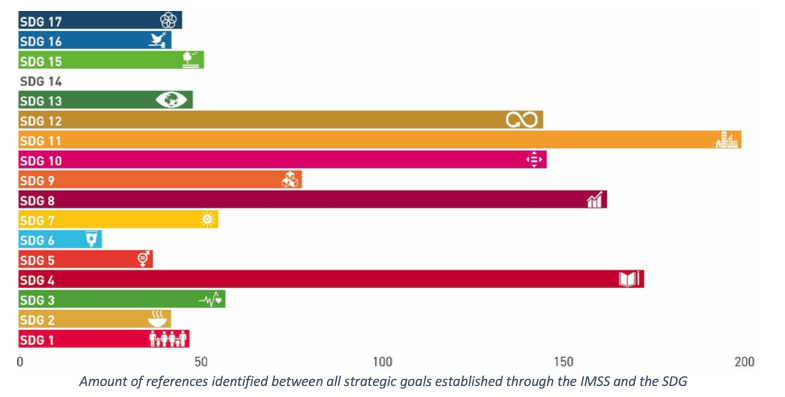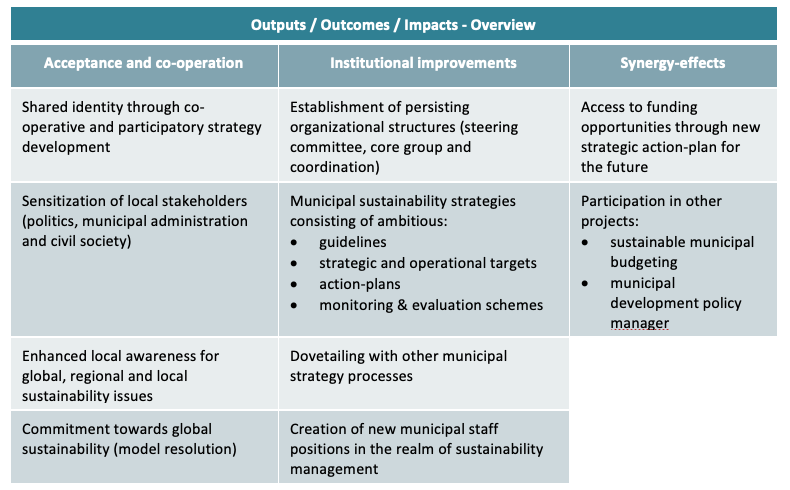Globally Sustainable Municipalities in North-Rhine Westphalia - Developing 15 Integrated Municipal Sustainability Strategies to Localize the SDGs
Description
Between early 2016 and mid-2018, 15 municipalities representing 2.5 million people in the federal state of North Rhine-Westphalia (NRW), Germany, developed individual integrated municipal sustainability strategies (IMSS) in the context of the Agenda 2030 as well as the national and the regional sustainability strategies with assistance of the Service Agency Communities in One World (SKEW) of Engagement Global and the Sustainability Network North Rhine-Westphalia (LAG 21 NRW). The project was funded by the Federal Ministry for Economic Cooperation and Development (BMZ).
Starting in early 2016, 15 municipalities in NRW developed IMSS in the context of the 2030 Agenda as part of the project 'Global Sustainable Municipality in North Rhine-Westphalia’ (GNK NRW). In a participatory process the municipalities transferred the SDGs to the local level ("Localizing the SDGs") by designing IMSS with specific local targets. These strategies highlight the international effects of local action and underline the importance of global responsibility at the local level. Following the principles “within the municipality for the municipality†and “within the municipality for the worldâ€Â, the 2,5-year process of IMSS development had two overall objectives:<br />
<br />
1) Considering local challenges and an urban development that links ecological, social and<br />
economic concerns regarding the global boundaries.<br />
<br />
2) Promoting the One World perspective and the associated responsibility towards people in<br />
other parts of the world, especially those in the Global South.
The project was implemented in NRW, which is the most populous federal state in Germany with approximately 17.7 million inhabitants. Even though this state is characterized by its high population density of 524 people per km², it has very heterogeneous settlement structures. While urban structures like the Rhine Ruhr metropolitan region are very condensed, there are several rural regions in NRW. Hence, the model municipalities were faced with different demographic, economic and structural initial situations that had to be considered by ways of individual analysis and adapted process support.
The development and implementation of IMSS is designed as a locally mandated continuous improvement process (CIP). A CIP ensures the effectiveness and success monitoring of a sustainability strategy and aims at constant improvement and further development regarding the formulated content.
Moreover, the targets contribute to attaining 96 of the 169 Agenda 2030 targets. While most objectives can be located within the generic fields of action of a municipality, all municipalities similarly deal with objectives and measures that expand the view to the Global South. Although these objectives are implemented by local actors, they have positive effects in other regions of the world. Concrete contributions are made in order to achieve SDG 10 "Reduced Inequalities", SDG 12 "Responsible Consumption and Production" and SDG 17 "Partnerships for the Goals". Twelve municipalities developed specified objectives that address fair procurement or fair consumption, thereby contributing to the achievement of SDG 12. All municipalities address relevant partnerships in their sustainability strategies. Overall, 10 twinnings and at least 14 project partnerships with municipalities and actors from the Global South are planned. Currently, the municipalities are adopting and implementing the IMSS. In a first step objectives and measures are now integrated into municipal budget.
- Committed and engaged steering committee and core group members
- Structures and processes adaptable to local needs
- Interlinkage of bottom-up and top-down approaches
- Integration of civil society and municipal citizens via sustainability conferences
Constraints:
- Limited time resources of honorary members of the steering committees
- Dependence on local windows of opportunity and election periods
The project enabled municipalities to make a wide array of activities for development part of their everyday routine and monitor the results of these activities on a regular basis. Moreover, even after the projects’ finalization, it continually induces tangible contributions towards implementing the Agenda 2030 at the local level. It enables sustainable and integrated local development that combines social, economic and environmental objectives, advocates an enhanced engagement for sustainable development, and promotes cross-sectoral thinking and action within the municipality. However, it must be noticed that most of the projects’ beneficial outcomes will only materialize during the next decade, as the model municipalities implement the action-plans of their IMSS.
SDGS & Targets
Deliverables & Timeline
Resources mobilized
Partnership Progress
Feedback
Action Network


Timeline
Entity
Region
- Europe
Geographical coverage
Photos



Website/More information
Countries
Contact Information
Carlo Schick, Scientific Project Manager
